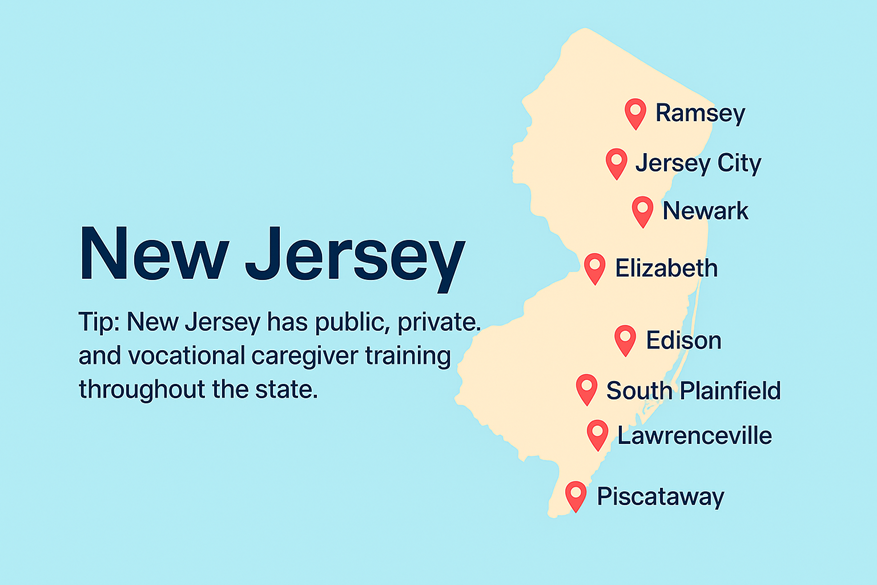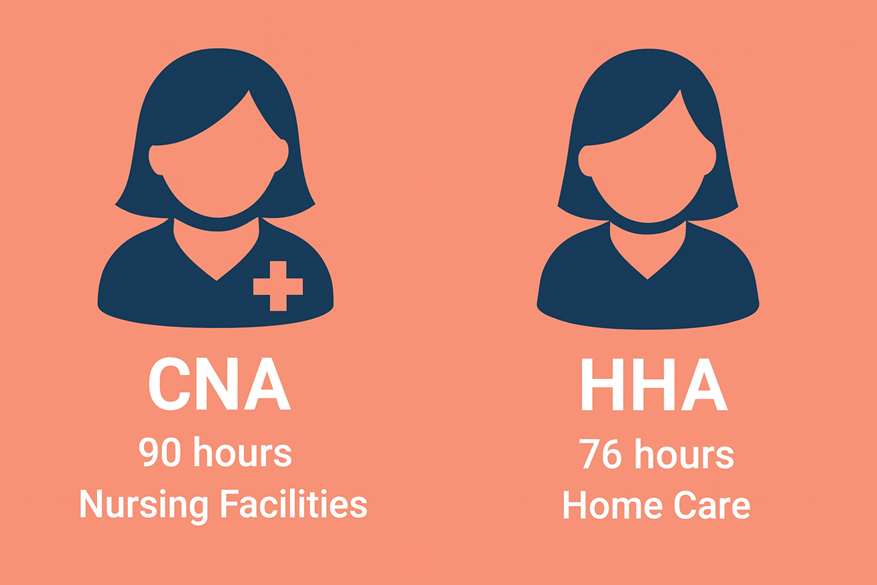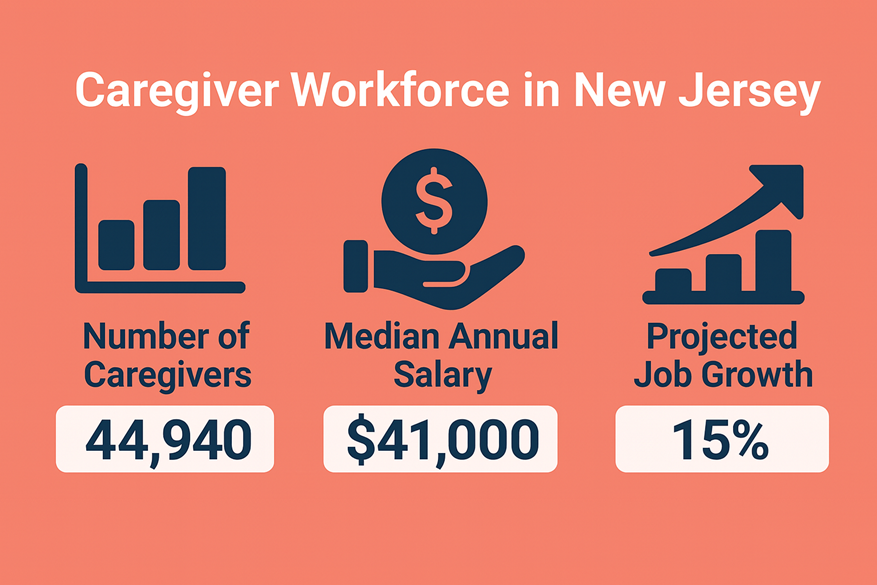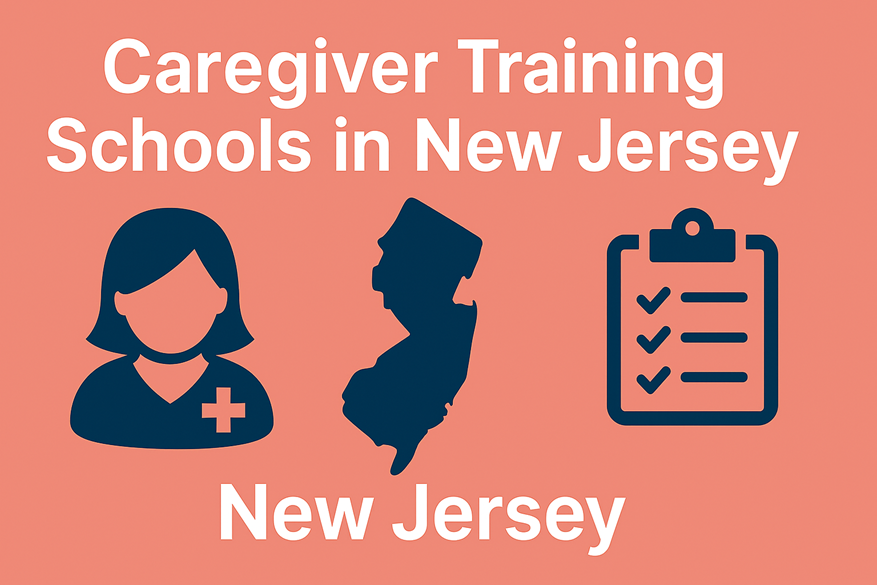If you’re thinking about becoming a Certified Nurse Aide (CNA) or a Home Health Aide (HHA) in New Jersey, you’re already on the right path. Caregiving is more than just a job—it’s a chance to truly make a difference in someone’s life. Whether you’re helping seniors with daily tasks or supporting people recovering at home, trained caregivers are in high demand across the state. And thankfully, New Jersey has a wide range of training options to help you get started quickly and affordably.
Let’s break down the best paths to becoming a CNA or HHA in New Jersey, from colleges to vocational schools, plus everything you need to know about certification, job opportunities, and salary expectations.
Training Paths for Caregivers in New Jersey

Public & Private Colleges in New Jersey
Several community colleges and private institutions across New Jersey offer CNA and HHA programs. These are usually structured with more classroom hours, sometimes including general education or medical coursework, and can be a great fit if you’re looking to expand into nursing or healthcare later on.
Many of these programs are offered in cities like Newark, Jersey City, Paterson, and Camden. They’re usually state-approved and lead directly to certification testing.
Vocational & Career Schools in New Jersey
If you want to get trained and working as fast as possible, vocational and career schools are often your best bet. These programs tend to be shorter, focused, and highly practical. You’ll learn all the skills you need to pass the certification exams and start working right away.
From North Jersey to South Jersey, cities like Elizabeth, Trenton, Atlantic City, and Toms River all have accessible options. Many vocational programs also offer flexible schedules for working adults or parents.
Public & Private Colleges with CNA/HHA Programs
Vocational & Career Schools with Caregiver Training
CNA vs. HHA in New Jersey: What’s the Difference?

In New Jersey, both CNAs and HHAs play important roles, but their training, certification, and job settings differ a bit.
- Certified Nurse Aide (CNA): CNAs are trained to work in long-term care facilities like nursing homes or rehab centers. To become a CNA in New Jersey, you need to complete a state-approved training program with at least 90 hours (including 16 clinical hours). After training, you’ll take the New Jersey Nurse Aide Exam. Once you pass, you’ll be added to the New Jersey Nurse Aide Registry managed by PSI.
- Home Health Aide (HHA): HHAs in New Jersey are often trained under the Certified Homemaker-Home Health Aide (CHHA) title. They provide care in clients’ homes under the supervision of a registered nurse. CHHA programs include 76 hours of training, with at least 16 hours of clinical experience. After completing training, you’ll apply for certification through the New Jersey Board of Nursing, not PSI.
- Key Differences:
- CNAs usually work in facilities. HHAs typically work in private homes.
- CNA training is slightly longer and leads to a different registry.
- HHA jobs often offer more flexible or part-time hours.
- You can often stack the training—many schools offer CNA + HHA bundles.
PCA in New Jersey: What You Should Know
- Not a licensed title: In New Jersey, “PCA” is typically used as a job title by employers—not as a state-recognized license or certification like CNA or CHHA (Certified Homemaker-Home Health Aide).
- Most PCA jobs require CHHA certification:
Many employers in New Jersey use “PCA” and “HHA” interchangeably, especially for roles involving personal care at home. If you’re doing hands-on work like bathing, dressing, or mobility assistance, you’re generally required to have a CHHA license from the New Jersey Board of Nursing. - Some PCAs may not need certification:
There are entry-level roles in private duty care or as companions that may use the PCA title and don’t require formal certification—but these usually:- Do not involve medical or hands-on personal care
- Offer lower pay
- Have limited job stability
PCA vs HHA vs CNA in New Jersey
| Role | Certification Required? | Regulating Body | Job Setting |
|---|---|---|---|
| CNA | Yes (90 hours + exam) | PSI & Nurse Aide Registry | Nursing facilities, long-term care |
| CHHA / HHA | Yes (76 hours + application) | NJ Board of Nursing | Home care, hospice, agencies |
| PCA | Usually yes (CHHA) | Often same as HHA | Home care (non-medical) or companionship |
If you’re considering working as a PCA in New Jersey, your best option is to complete a CHHA program. It opens more doors and meets most employers’ requirements for PCA-labeled jobs.
Job Market in New Jersey (As of August 2025)

Caregiving jobs are steady and growing in New Jersey. With the state’s aging population and expanded home care services, CNAs and HHAs are both in strong demand—especially in counties like Essex, Bergen, Middlesex, and Camden.
Here’s what the current job market looks like:
- CNA Salary Range: $36,000 to $47,000 per year
- HHA Salary Range: $30,000 to $42,000 per year
- Top Employers: Hospitals, skilled nursing facilities, home care agencies, and hospice services
- High-Demand Areas: Newark, Trenton, Camden, Jersey City, Atlantic City
According to the New Jersey Department of Labor, personal care and nursing assistant roles are projected to grow faster than average through 2030.
Certification & Licensing: What You Need to Do
To legally work as a CNA or HHA in New Jersey, you’ll need to follow the state’s certification process. Here’s a step-by-step overview:
For CNA Certification:
- Complete a State-Approved CNA Program (90 hours minimum)
- Register and Pass the NJ Nurse Aide Exam through PSI
- Get Listed on the NJ Nurse Aide Registry
- Renew Every 2 Years (must have worked at least 7 hours in a 24-month period)
Resources: New Jersey Nurse Aide Registry – PSI
For HHA (CHHA) Certification:
- Enroll in a Board-Approved CHHA Program (76 hours minimum)
- Submit Application to the NJ Board of Nursing
- Undergo Background Check & Fingerprinting
- Receive Certification
- Renew Every 2 Years (with continuing education)
Resources: New Jersey Board of Nursing – CHHA Info
Ready to Start? Here’s Your Next Step
Whether you’re just exploring the idea or already comparing programs, now is a great time to move forward. New Jersey has many caregiver schools, from community colleges to local training centers that can get you ready to work in just a few weeks. Caregiving is not just a career—it’s a chance to help others, support families, and build a path in the growing healthcare field.
Pick a school that fits your budget, schedule, and location, and start your journey toward becoming a CNA or HHA today. If you need more details, don’t hesitate to call the schools directly or check their websites for enrollment deadlines and financial aid options.
Disclaimer
All program details, costs, and certification steps are based on information available as of August 2025. Requirements and fees may change, so always confirm with the training provider or New Jersey’s official licensing bodies before enrolling.

